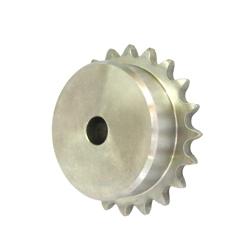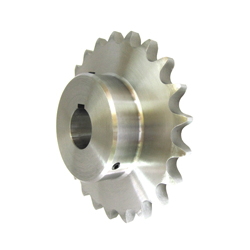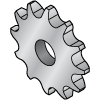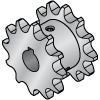(!)NOTE : Windows 7 users won’t be able to use some latest features of eCatalog/WOS since Microsoft is ending support for Windows 7 on 14 Jan, 2020. Please upgrade your system for uninterrupted services.
- Please note that the MISUMI Pune office and warehouse will be closed on November 20th due to the state election.
- Notice of End of Sales for Economy Series Pneumatic Equipment Category. More information.
KATAYAMA CHAIN Sprockets(Nominal Number:C2080H)
Brand |
|
|---|---|
| CAD |
|
| Days to Ship |
|
2 items
- Sort By
-
You can add up to 6 items per a category to the compare list.

Standard 2080 Double Pitch Sprocket, S Roller B Type
KATAYAMA CHAIN
Rich lineup of variations in KANA standard sprocket count, number of teeth, and shape. The shaft holes of this product are not yet machined, so machining of shaft holes is required when using.
Sprocket Shape Nominal Number Number of Teeth(T) Shaft Bore Dia. d(mm) Number of Strands Material Chain Type Type Shaft Type Surface Treatment Roller Type Cleaning Method Characteristics/Applications Environmentally friendly Shape B C2080H 13 ~ 25 16 ~ 26 1 Steel Double Pitch Pilot Hole Type Standard Pilot Bore Not Provided S Roller - - - From: ₹ 3,009.38 Days to Ship: 5 Day(s) or more  5 Day(s) or more
5 Day(s) or more
-
You can add up to 6 items per a category to the compare list.

FBN2080B finished bore double-pitch sprocket for S roller
KATAYAMA CHAIN
FBN finished sprocket has shaft hole tolerance H7, standard grade parallel keys that satisfy JIS standards, metric coarse machining, and hex socket head screws already inserted.
[Features]
· BN finished sprocket has shaft hole tolerance H7, standard grade parallel keys that satisfy JIS standards, metric coarse machining, and hex socket head screws already inserted.Sprocket Shape Nominal Number Number of Teeth(T) Shaft Bore Dia. d(mm) Number of Strands Material Chain Type Type Shaft Type Surface Treatment Roller Type Cleaning Method Characteristics/Applications Environmentally friendly Shape B C2080H 19 ~ 25 30 ~ 45 1 Steel Double Pitch Shaft Bore Machined Type Shaft Bore Machining Configurable Not Provided S Roller - - - From: ₹ 4,751.67 Days to Ship: 8 Day(s) or more  8 Day(s) or more
8 Day(s) or more
| Brand |
|---|
| Product Series |
| CAD |
| From |
| Days to Ship |
| Sprocket Shape |
| Nominal Number |
| Number of Teeth(T) |
| Shaft Bore Dia. d(mm) |
| Number of Strands |
| Material |
| Chain Type |
| Type |
| Shaft Type |
| Surface Treatment |
| Roller Type |
| Cleaning Method |
| Characteristics/Applications |
| Environmentally friendly |
You can add up to 6 items per a category to the compare list. | You can add up to 6 items per a category to the compare list. | |
| Brand | KATAYAMA CHAIN | KATAYAMA CHAIN |
| Product Series | ||
| CAD |
|
|
| From | ₹ 3,009.38- | ₹ 4,751.67- |
| Days to Ship | 5 Day(s) or more | 8 Day(s) or more |
| Sprocket Shape | Shape B | Shape B |
| Nominal Number | C2080H | C2080H |
| Number of Teeth(T) | 13 ~ 25 | 19 ~ 25 |
| Shaft Bore Dia. d(mm) | 16 ~ 26 | 30 ~ 45 |
| Number of Strands | 1 | 1 |
| Material | Steel | Steel |
| Chain Type | Double Pitch | Double Pitch |
| Type | Pilot Hole Type | Shaft Bore Machined Type |
| Shaft Type | Standard Pilot Bore | Shaft Bore Machining Configurable |
| Surface Treatment | Not Provided | Not Provided |
| Roller Type | S Roller | S Roller |
| Cleaning Method | - | - |
| Characteristics/Applications | - | - |
| Environmentally friendly | - | - |
Loading...
Configure
Specification/Dimensions
-
Sprocket Shape
-
 Shape A
Shape A -
 Shape B
Shape B -
 Shape C
Shape C -
 Shape SD
Shape SD
-
-
Nominal Number
-
Number of Teeth(T)
-
Shaft Bore Dia. d(mm)
- 4
- 5
- 6
- 7
- 8
- 9
- 9.53
- 10
- 10K
- 11
- 12
- 12.7
- 13
- 14
- 15
- 16
- 17
- 18
- 19
- 20
- 21
- 22
- 23
- 24
- 25
- 26
- 27
- 28
- 29
- 30
- 31
- 32
- 33
- 34
- 35
- 36
- 37
- 38
- 39
- 40
- 41
- 42
- 43
- 44
- 45
- 46
- 47
- 48
- 49
- 50
- 51
- 52
- 53
- 54
- 55
- 56
- 57
- 58
- 59
- 60
- 61
- 62
- 63
- 64
- 65
- 66
- 67
- 68
- 69
- 70
- 71
- 72
- 73
- 74
- 75
- 76
- 77
- 78
- 79
- 80
- 81
- 82
- 83
- 84
- 85
- 86
- 87
- 88
- 89
- 90
- 91
- 92
- 93
- 94
- 95
- 96
- 97
- 98
- 99
- 100
- 101
- 102
- 103
- 104
- 105
- 106
- 107
- 108
- 109
- 110
- 111
- 112
- 113
- 114
- 115
- 116
- 117
- 118
- 119
- 120
- 121
- 122
- 123
- 124
- 125
- 126
- 127
- 128
- 129
- 130
- 131
- 132
- 133
- 134
- 135
- 136
- 137
- 138
- 139
- 140
- 141
- 142
- 143
- 144
- 145
- 146
- 147
- 148
- 149
- 150
- 151
- 152
- 153
- 154
- 155
-
Number of Strands
- 1
- 2
-
Material
- Steel
- Stainless Steel
- Engineering Plastic
-
Chain Type
-
Type
- Pilot Hole Type
- Shaft Bore Machined Type
- Keyless Type
-
Shaft Type
-
Surface Treatment
-
Roller Type
-
Cleaning Method
- Degreasing
- Precision Cleaning
- Electrolytic Polishing + Precision Cleaning
-
Characteristics/Applications
- Clean washed
-
Environmentally friendly
- RoHS Compliant (10 Substances)
Narrow search by specifying Manufacturer
Related Categories to Sprockets
FAQ Sprockets
- Question: What are sprockets and how are they used in mechanical systems?
- Answer: Chain sprockets are mechanical components used in combination with chains to enable drive forces to be transmitted via a chain. The sprocket teeth engage with the chain links to establish a connection between the sprocket and the chain. Sprockets are crucial elements in the design and mechanics of machines and systems, indispensable for the mechanical transmission of movement and force, for example, in chain conveyors, packaging machines, and printing presses.
- Question: Can you explain the different types of sprockets, such as A, B, and C types?
- Answer: Chain sprockets are categorized into four main types of sprockets as established by the American National Standards Institute (ANSI):
1. Type A sprockets have no hubs, consisting solely of the plate with teeth.
2. Type B sprockets have a hub on one side for heavy loads and larger systems.
3. Type C sprockets, which have hubs of equal thickness on both sides of the plate for heavy loads and larger systems.
4. Type C (Offset) sprockets, also referred to as Type D, have two unequal-sized hubs, forming an asymmetric sprocket The choice of sprocket type depends on the specific requirements of the machine or system, such as space constraints, load capacity, and desired performance characteristics. - Question: What materials are commonly used to manufacture sprockets, and why?
- Answer: Chain sprockets are commonly manufactured using various materials, each chosen for specific applications and performance characteristics. The most common materials for chain sprockets include:
1.Carbon Steel: Suitable for solid sprockets in non-corrosive environments. It offers good wear resistance and is cost-effective.
2.Stainless Steel: Used for solid sprockets in corrosive environments. It provides excellent corrosion resistance and durability, such as in vegetable processing.
3.Plastic (UHMW Polyethylene and Nylon): These materials are used for sprockets in food processing and other industries where cleanliness and low friction are important. UHMW Polyethylene can withstand continuous temperatures up to 180°F, while Nylon sprockets provide 2-3 times the strength of UHMW and can withstand higher temperatures - Question: How does the number of teeth on a sprocket affect its performance?
- Answer: The number of teeth on a chain sprocket significantly impacts its performance. More teeth result in higher torque but lower speed, while fewer teeth lead to higher speed but less torque, following gear ratio principles. This choice affects wear and durability, as fewer teeth concentrate load, potentially increasing wear, while more teeth distribute load, enhancing durability. Additionally, sprockets with more teeth often provide smoother motion, reducing noise and vibration. Spatial constraints within the system must also be considered. Overall, the number of teeth on a chain sprocket is critical, influencing torque, speed, wear, durability, smoothness of operation.
- Question: What should be considered when selecting a sprocket for a specific application?
- Answer: Factors to consider when selecting a chain sprocket:
1. Chain Size: Ensure compatibility with the chain's size, pitch, and width for proper engagement and wear prevention.
2. Number of Teeth: Determine the appropriate number of teeth to balance speed, torque, and efficiency, considering the input-output relationship.
3. Material: Choose the sprocket material based on environmental conditions, load capacity, temperature range, and chemical resistance. Options include carbon steel, stainless steel, and plastic.
4. Shaft Size: Ensure compatibility with shaft size and type.
5. Alignment: Properly align the sprocket with the chain and other system components to prevent premature wear and ensure optimal performance.
6. Lubrication: Use appropriate lubrication compatible with the sprocket material and environmental conditions to prevent wear and extend the life of the chain and sprocket. - Question: How does the material of a sprocket influence its strength and friction resistance?
- Answer: When selecting material for chain sprockets, several key factors must be considered:
1. Selection Criteria: Material choice based on environmental conditions, load capacity, temperature range, and chemical resistance.
2. Strength and Friction Resistance: Material choice significantly impacts these characteristics.
3. Hardening Process: Essential for enhancing wear resistance and shock load absorption in sprocket teeth.
4. Optimization: The right material and hardening process optimize strength and friction resistance for specific applications.











How can we improve?
How can we improve?
Thank you for your time.
Your feedback is essential for our continuous improvement
Privacy Policy
Thank you for your cooperation.
Thank you for your time.
Your feedback is essential for our continuous improvement
Please use the inquiry form.
Privacy Policy